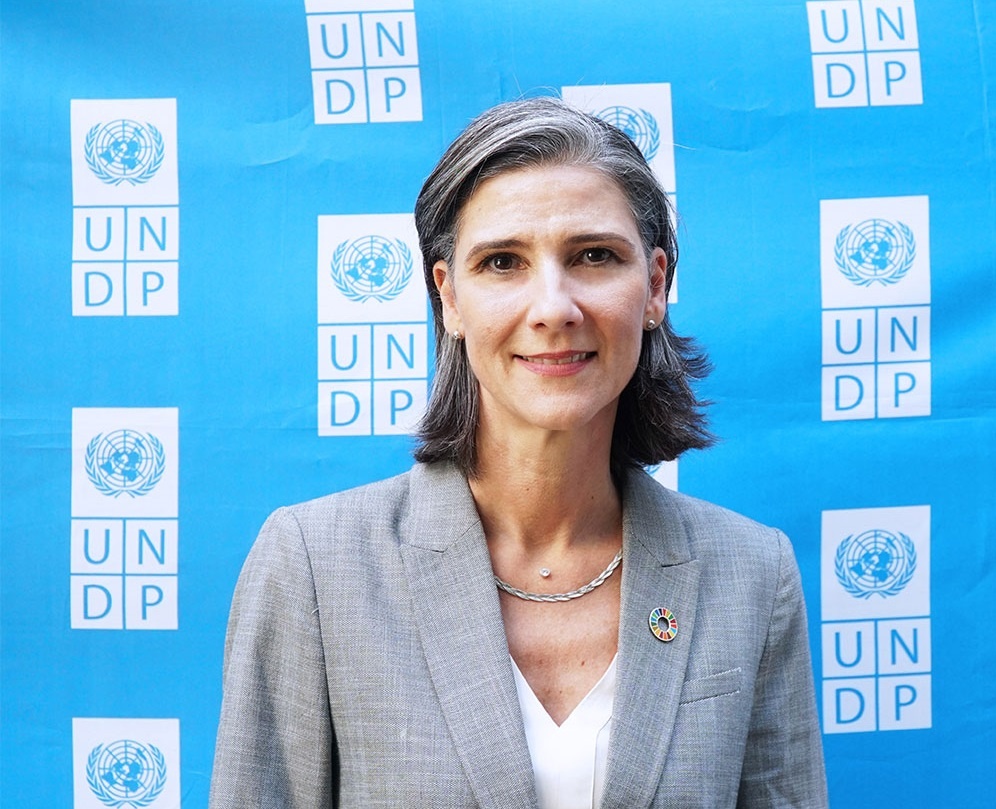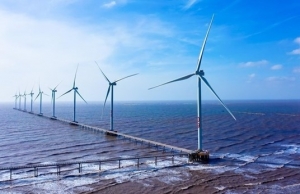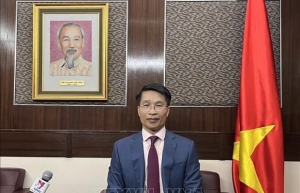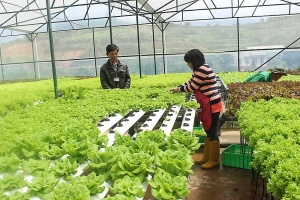Commitment proves Vietnam is serious on change
What are your assessments of socioeconomic development in Vietnam, including the implementation of the UN’s Sustainable Development Goals (SDGs)?
 |
| Ramla Khalidi, resident representative of the United Nations Development Programme in Vietnam |
Vietnam has earned the respect of the global community and the UNDP for its achievements in poverty reduction and human development. The nation offers many positive lessons for other developing countries, especially regarding eliminating hunger, accelerating job creation for individuals and households in the bottom 40 per cent of the population by income, increasing access to quality education and healthcare, and building basic infrastructure to achieve universal access to electricity and clean water.
The country’s commitment is evident in the incorporation of the SDGs to Vietnam’s related goals, which are included in national development plans and strategies. I am deeply impressed by the close partnership between the government and ourselves and other UN agencies to closely monitor progress toward the SDGs, improving the quality of data and analysing remaining gaps and policy responses.
The rapid and equitable roll-out of vaccines during the pandemic was a good example of the capacity of the government to plan and implement a complex national programme in a timely and effective manner. The success of the immunisation programme made possible a robust economic recovery in 2022, including a significant rebound in domestic consumption among the poor and near poor.
Vietnam is still among the most vulnerable countries to climate change. Despite tremendous domestic efforts to effective response to disasters and building resilience and adaptive capacities for the vulnerable communities who are at the frontlines of climate extremes, the country is still at high stake of climate losses annually in a number of sectors such as infrastructure, agriculture, natural resources, and transportation.
At the same time, Vietnam is now also ranked among the top 20 greenhouse gas emitters globally. This couples with the unsustainable management of natural resources will make it very difficult for the country to meet SDG13 on climate action, SDG14 on life below water, SDG15 on life on land, while also risking or delaying the progress to achieve other goals.
What are the main challenges for the country in the coming time?
Vietnam is not exceptional to the challenges the world is facing. The country enjoyed a robust and broad recovery in 2022 after two years of slow growth. GDP growth for the year was estimated to be 8.02 per cent, which was much higher than earlier forecasts. This strong recovery was achieved despite powerful headwinds like rising energy and food prices, a strengthening US dollar, and slow growth in external markets.
However, 2023 is likely to be more challenging as the external environment deteriorates. High inflation, partly resulting from the war in Ukraine, has led to higher interest rates, tighter credit conditions, and weakening global demand. Export growth therefore is likely to be affected. Some domestic businesses will have to cut costs to manage a competitive external environment and tighter credit conditions at home.
Climate change is the greatest challenge facing Vietnam, which with its low-lying deltas and long coast is one of the most vulnerable countries in the world. Every economic sector and region will be affected by the transition to renewable energy and adaptation to the negative effects of climate change. Achieving a just energy transition will require an unprecedented investment effort, which will oblige everyone to realign priorities and indeed to make some personal sacrifices.
What will be the priorities for the Vietnamese government to further spur on economic growth, and maintain the balance of socioeconomic development?
In this situation, public investment will play an important role in sustaining domestic demand, provide essential services like healthcare, education and clean water and sanitation, and to provide conducive conditions to crowd in private investments and new international official development assistance to tackle the climate challenges.
Adapting to the negative effects of climate change and urgently mitigating the cause of global warming by cutting emissions to net-zero target by 2050 will require an additional $30 billion per year in public and private investment over and above the business-as-usual situation.
A priority for 2023 and for the remaining years of the socioeconomic development plan and strategy to 2030 is to achieve a closer alignment of public investment to national plans and strategies. Public investment in 2022 was about 7 per cent of GDP, which is among the highest in the region, but 80 per cent of this total is dedicated to small projects that are completed in one year or less.
Meanwhile, large-scale projects of national importance are delayed or gridlocked.
This is not just a question of the speed of disbursement: the main problem is the quality of public investment, not just delivery. Public investment is an essential tool of industrial policy and adjustment to climate change. At the moment, because of fragmentation of planning and implementation, this tool is not being used to full effect.
Gender equality is another SDG that requires more attention as we reach the halfway point in the Sustainable Development Agenda to 2030. There are bright spots, such as female labour force participation and access to secondary and higher education. But some problems remain, including representation of women at higher levels of government and the National Assembly, wage inequality, and sharing the burden of domestic and caring work within the home. Women and girls need more protection from domestic violence.
Above all, in order to best to maintain the balance of socioeconomic development and overcoming macroeconomic challenges, in 2023 Vietnam needs to continue to spare no effort in ensuring strong, transparent, and accountable institutions, public engagement including participation of women and vulnerable groups, and last but not least, equitable access to justice for all different groups in society.
Leaders from Vietnam and the International Partners Group recently agreed on a just energy transition partnership (JETP) worth $15.5 billion. What is the significance of this deal?
In the next 3-5 years, as the country embarks on a greener and more resilient path, Vietnam needs to accelerate preparation for a package of public instruments to de-risking investments in renewables and design a feasible process to phase out coal.
Currently, we are initiating assessment on the impact of phasing-out coal power and energy transition in Vietnam and defining what these processes would specifically mean for the nation. It will inform further our ongoing assessment of the total socioeconomic impacts of the Energy Master Plan to reach net-zero carbon emissions by 2050.
This year, we stand ready to support the government in the detailed formulation and implementation of the JETP resource mobilisation plan. This includes our proven technical assistance services to the governments in green transition/nationally appropriate mitigation actions projects, which can help Vietnam identify cost-effective de-risking public instruments to promote and scale up private sectors investments in the JETP’s resource mobilisation plan.
 | Vietnam offshore wind power sparks influx of foreign investment: Nikkei Asia Nikkei Asia, a news service in Japan, ran an article on January 6 saying that Vietnam's offshore wind power sparks an influx of foreign investment. |
 | Hong Kong firms seek more cooperation opportunities in Vietnam A business delegation of Hong Kong (China) will visit Hanoi and Ho Chi Minh City from January 8-14 to seek economic and investment cooperation opportunities between Vietnam and Hong Kong and Greater Bay Area in particular, and China in general. |
 | Vietnamese exporters exceed 2022 projections despite Q4 blip Despite facing increasing difficulties in the fourth quarter of 2022, many Vietnamese enterprises exceeded projections and are well poised to cope with challenges in 2023. |
 | Vietnam's green startups show growth Green startups show strong growth in the Vietnamese market as sustainable development projects draw the attention of several venture capitalist funds. |
What the stars mean:
★ Poor ★ ★ Promising ★★★ Good ★★★★ Very good ★★★★★ Exceptional
Related Contents
Latest News
More News
- Digital shift reshaping Vietnam’s real estate brokerages (December 31, 2025 | 18:54)
- Allen & Gledhill recognised as Outstanding M&A Advisory Firm (December 18, 2025 | 14:19)
- Inside Lego Manufacturing Vietnam (December 18, 2025 | 11:45)
- The next leap in Cloud AI (December 11, 2025 | 18:19)
- Vietnam’s telecom industry: the next stage of growth (December 11, 2025 | 18:18)
- Five tech predictions for 2026 and beyond: new era of AI (December 11, 2025 | 18:16)
- CONINCO announces new chairman and CEO (December 10, 2025 | 11:00)
- How AWS is powering the next-gen data era (December 09, 2025 | 13:14)
- Outlook in M&A solid for Singapore (December 08, 2025 | 10:31)
- Vietnamese firms are resetting their strategy for global markets (December 05, 2025 | 17:04)

 Tag:
Tag:




















 Mobile Version
Mobile Version